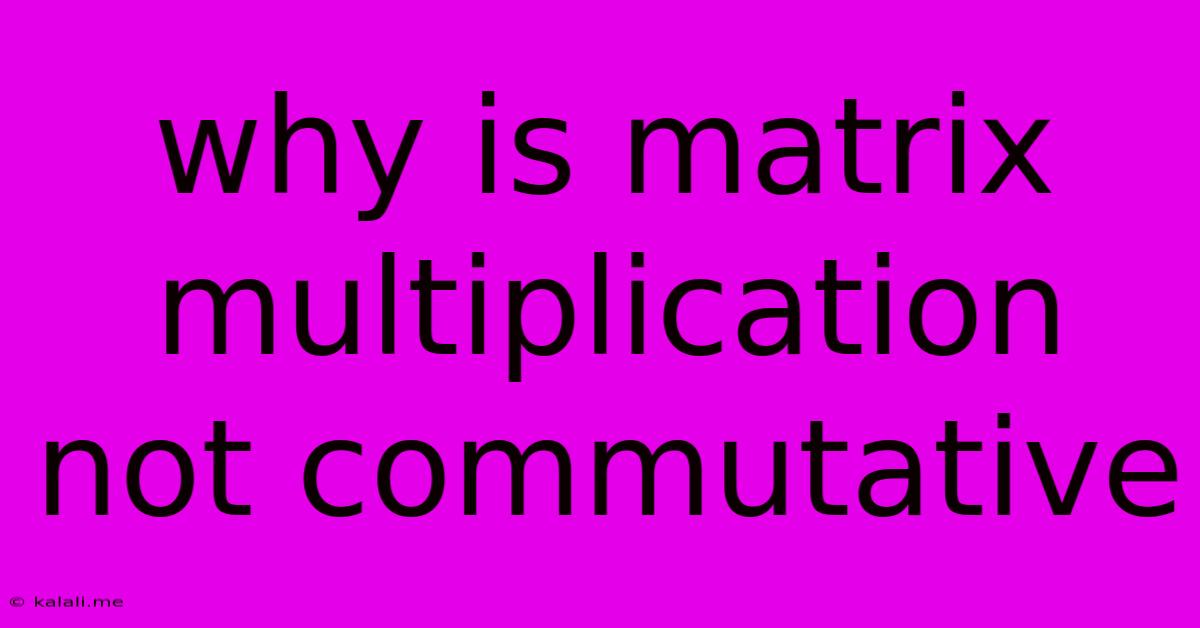Why Is Matrix Multiplication Not Commutative
Kalali
Jun 02, 2025 · 3 min read

Table of Contents
Why is Matrix Multiplication Not Commutative? A Deep Dive into Non-Commutativity
Matrix multiplication is a fundamental operation in linear algebra, with widespread applications in computer graphics, quantum mechanics, and machine learning. Unlike typical number multiplication, however, matrix multiplication is not commutative. This means that the order in which you multiply matrices significantly impacts the result; A x B ≠ B x A, in most cases. This article delves into the reasons behind this non-commutative property, exploring the underlying concepts and providing illustrative examples.
This seemingly simple yet crucial concept is often a stumbling block for beginners. Understanding why matrix multiplication doesn't commute is vital for accurately applying matrix operations in various fields. We will unpack this through both intuitive explanations and concrete examples.
Understanding the Fundamentals of Matrix Multiplication
Before exploring non-commutativity, let's briefly review matrix multiplication itself. To multiply two matrices, the number of columns in the first matrix must equal the number of rows in the second. The resulting matrix's dimensions are determined by the number of rows in the first matrix and the number of columns in the second. Each element in the resulting matrix is calculated as the dot product of a row from the first matrix and a column from the second.
For example, consider two matrices, A and B:
A = [[1, 2], [3, 4]]
B = [[5, 6], [7, 8]]
The resulting matrix, C = A x B, would be:
C = [[15 + 27, 16 + 28], [35 + 47, 36 + 48]] = [[19, 22], [43, 50]]
Why the Order Matters: Linear Transformations and Composition
The non-commutative nature of matrix multiplication stems from its representation of linear transformations. Each matrix can be viewed as a transformation that maps vectors from one space to another. Multiplying matrices represents the composition of these transformations – applying one transformation after another. The order in which you apply these transformations drastically affects the final outcome.
Imagine a rotation followed by a scaling transformation. Applying a rotation followed by a scaling will yield a different result than scaling and then rotating. This difference directly corresponds to the non-commutative nature of matrix multiplication when representing these transformations. The final position of a vector will be different depending on the order of operations.
A Simple Example Illustrating Non-Commutativity
Let's consider a simpler example to further illustrate this point:
A = [[1, 0], [0, 0]]
B = [[0, 1], [0, 0]]
A x B = [[0, 1], [0, 0]]
B x A = [[0, 0], [0, 0]]
In this case, A x B ≠ B x A, clearly demonstrating the non-commutative property. The different results highlight how the order of applying the transformations represented by A and B leads to entirely different outcomes.
Dimensions and Non-Commutativity
It's also important to note that sometimes the product AB might exist but BA might not even be defined due to incompatible dimensions. If matrix A has dimensions m x n and matrix B has dimensions p x q, then for AB to be defined, n must equal p. For BA to be defined, q must equal m. Unless these conditions are met simultaneously (that is m=n=p=q, i.e. square matrices), the order of multiplication becomes irrelevant as one product will simply not exist.
Conclusion: Embracing the Non-Commutative Nature of Matrix Multiplication
The non-commutative nature of matrix multiplication is not a bug; it's a feature directly tied to the nature of linear transformations and their composition. Understanding this fundamental property is crucial for anyone working with matrices and their applications in various fields. Mastering this concept will pave the way for a deeper understanding of linear algebra and its practical applications. Remember to always consider the order of matrix multiplication as it significantly impacts the final result.
Latest Posts
Latest Posts
-
Can You Dump Grease Down The Drain
Jun 03, 2025
-
Hope This Email Finds You Well
Jun 03, 2025
-
Cleaning Battery Terminals With Baking Soda
Jun 03, 2025
-
How To Install Fonts In Overleaf
Jun 03, 2025
-
Why Are Unsaturated Fats Liquid At Room Temperature
Jun 03, 2025
Related Post
Thank you for visiting our website which covers about Why Is Matrix Multiplication Not Commutative . We hope the information provided has been useful to you. Feel free to contact us if you have any questions or need further assistance. See you next time and don't miss to bookmark.